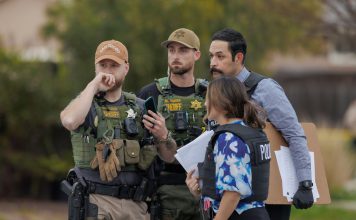Director Joel Schumacher (
”
Flatliners
”
”
The Lost Boys
”
) knows how to milk a gimmick for all it’s worth. A filmmaker
capable of strong work, as his
”
Tigerland
”
and
”
Cousins
”
prove, he frustratingly clings to mainstream moviemaking
clich
és in the majority of his films, which also include the
anemic
”
A Time To Kill
”
and the insufferable
”
St. Elmo’s Fire.
”
Director Joel Schumacher (“Flatliners” “The Lost Boys”) knows how to milk a gimmick for all it’s worth. A filmmaker capable of strong work, as his “Tigerland” and “Cousins” prove, he frustratingly clings to mainstream moviemaking clichés in the majority of his films, which also include the anemic “A Time To Kill” and the insufferable “St. Elmo’s Fire.”
“Phone Booth,” is a hit-and-miss, real-time thriller in the vein of a “Run Lola Run” without the running. The gimmick this time around is that Schumacher gets to exploit the claustrophobic nature of a Times Square phone booth, which is where the entire film takes place.
He takes a condescending, arrogant entertainment publicist named Stu (Colin Farrell), who just so happens to be cheating on his wife, puts him in a terrible predicament and abuses him before the audience’s eyes for what seems like twice the 85-minute running length.
It’s an exercise in torture, and according to the screenwriter and director, Stu deserves what he gets. It’s like we’re watching Stu being punished for his selfishness, but doesn’t our culture subconsciously tell us to be selfish?
The film unfolds as Stu, walking down the main strip in Times Square, goes into his usual phone booth to call his mistress Pamela (Katie Holmes). Being married to Kelly (Radha Mitchell), Stu purposely uses the phone booth line so his wife won’t suspect anything when she glances at his phone bills. This time, after calling Pamela and setting up a tryst, the phone booth phone rings. Who could be calling?
Stu picks up the phone as if by instinct and almost immediately wishes he didn’t, as an unnamed caller, a serial killer (Kiefer Sutherland) with a sniper rifle, is on the line. Quickly, just a few minutes into the film, the thriller elements come into play, as we are going to play cat and mouse with the caller, Stu, the police, the media and the two women in Stu’s life.
A game ensues between Stu and the caller, who has a stereoscopic rifle sight pointed at Stu’s head. Hang up, the caller says, and Stu will be killed. Stu, a little mortified, starts threatening and verbally abusing the caller, thinking it may be a prank, but the caller assures him that it is not. If he wants to find out he can always hang up, but he doesn’t because the caller fires a warning shot on the street, and not a single person in the crowded area notices a thing. It is New York City, after all – people are just going about their business.
The psychology in the phone booth between Stu and the caller is based on the premise that the caller knows everything about Stu, and Stu knows nothing of the caller. The caller knows of Stu’s condescending nature, and he is especially aware of Stu’s romantic indescretions. “You’re a liar, Stu,” the caller accuses. “You have to pay.”
Things get really convoluted when two prostitutes try to get Stu off the phone so they can use it. They have no idea what kind of predicament Stu is in, so they hammer him with insults, trying to get him to leave the booth. Of course, with the rifle sights pointed at his head, he has no choice but to stay on the phone. When their pimp is called and he tries to physically remove Stu from the booth, the sniper puts a bullet in the back of the pimp’s neck.
After the killing, the film takes a new spin, with the cops and the media joining the fold. Thinking Stu is the shooter, Captain Ramey (Forest Whitaker), commanding approximately 100 officers who now have Stu and the phone booth surrounded, tries to talk him out of the booth but can’t figure out why he won’t hang up the phone. Electronics stores on the main strip play the action out on the display model televisions that drape the facade of the windows.
“Phone Booth” is a desparate thriller that is suspenseful, but for me it was an exercise in patience. Frustrated with the stupidity of the characters, I felt the smartest character, by far, is the shooter/caller, who doesn’t appear until the film’s final shot. The film has sat on the shelf for over a year, as the actual Maryland area sniper incident of last summer caused the distributors to pull the film, waiting to release it until now. Despite the major lull in good films this spring, “Phone Booth” just doesn’t seem worth the wait.
PHONE BOOTH. Directed by Joel Schumacher. Screenplay by Larry Cohen. With Colin Farrell, Forest Whitaker, Kiefer Sutherland, Katie Holmes and Radha Mitchell. Rated R (language and violence), 85 minutes. Now playing at Bay Area Theaters.











